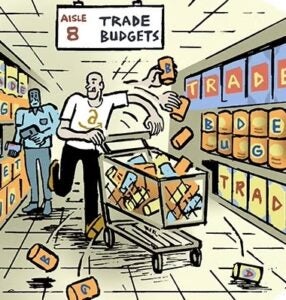To view one of the stranger assortments of merchandise out there, look no further than Temu.
If you haven’t heard of it or seen its barrage of paid media, Temu is an app and website where you go to “shop like a billionaire,” aka buy cheap stuff directly from China. By shipping from the factories, it avoids import taxes, keeps prices low and liquidates strange excess merchandise (for example, “girl power” pink dog vests sold in honor of International Women’s Day).
Owned by Pinduoduo (a company that makes Walmart looks small), Temu combines low prices with tons of advertising to give it a top ranking in app stores. Most recently, it made a splash by buying an ad in the Super Bowl – and running it twice during the game.
Temu is one of many commerce topics that Senior Editor James Hercher is bubbling up through his new commerce newsletter, which comes out every Wednesday. In the span of four weeks, James has ripped apart and put back together Meta’s commerce initiatives, Google’s Performance Max product, Shopify and, now, Temu.
We discuss his insights about the commerce space – including what he thinks of Temu – on the first half of the episode. Then we dig into the data privacy beat.
In her data privacy newsletter, which goes out Fridays, Managing Editor Allison Schiff has been poking at some of the privacy theater that goes on within the advertising industry and in privacy-adjacent industries.
But as data privacy has become more important, politically and culturally, it also has an opportunity, especially for privacy tech companies and professionals with some form of “data privacy” in their job titles. That said, offering consumers – er, people! – better data privacy in advertising still can feel like forcing down medicine. Making it easier to opt out means losing customers today, even if it boosts long-term trust with a company many tomorrows from now.
And, finally, data privacy in action can feel banal and bureaucratic, as Allison learned while tuning in to six hours of the California Privacy Protection Agency’s eight-hour public meeting on Friday. The company has an annual budget of $10 million, which is less than individual Big Tech companies spend on lobbying in a year.













